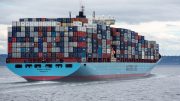European energy ministers have agreed on reaching a share of 40 percent renewables in the EU’s energy mix by 2030, thus increasing the previous 32-percent target and defining specific goals for different sectors. In an Energy Council meeting on Monday, 27 July, the national ministers also decided that renewable energy installations and power grids are to be considered of “overriding public interest”, a measure that should help accelerate approval procedures. The 27 ministers also agreed on a binding EU efficiency target to reduce final energy consumption by nine percent by 2030. Germany’s economy and climate minister Robert Habeck (Green Party) said the decisions had been a “great success” and called them “elementary” steps for making the EU independent from fossil energies and advancing climate action.
The Energy Council decisions will now be inform negotiations within the European Parliament and the European Commission. They are part of the bloc’s “Fit for 55” package that aims to reduce greenhouse gas emissions by 55 percent by 2030.
The second part of the package is dealt with by EU environment ministers today (28 July) and contains contentious topics like creating a second European emission trading scheme for transport and buildings (ETS 2), the climate social funds, (emission reduction) effort sharing between countries, and an effective 2035 ban of combustion engines. The latter is highly disputed within the German government coalition, as the pro-business coalition partner Free Democrats (FDP) refuse to consent to a ban unless zero-emission vehicles using e-fuels are also permitted and not just battery e-cars. Green Party environment minister Steffi Lemke, who will negotiate on behalf of the German government, said ahead of the meeting in Luxembourg she was following the cabinet-agreed line and the coalition agreement and would enter into the talks with the goal “that the European Commission can develop a mechanism to ensure CO2 reduction in the future, but also guarantee openness in terms of technology”. She said she expected “a very long day” of talks.
Chancellor Olaf Scholz also said that the coalition agreement was to be followed but told journalists at the final press conference of the G7 summit in Bavaria that “we want to make it possible for passenger cars with CO2-neutral drives, including e-fuels, to be registered after 2035″. The German car industry has long called for a “mixed technology” approach with e-cars and e-fuels in the decarbonisation of the transport sector, arguing this could deliver significant CO2 emissions reduction while simultaneously preserving tens of thousands of jobs in the sector. The FDP has consistently advocated for including e-fuels in mobility transition plans and the coalition treaty stopped short of naming an end date for combustion engine technology.
June 28, 2022
Originally published by Clean Energy Wire





